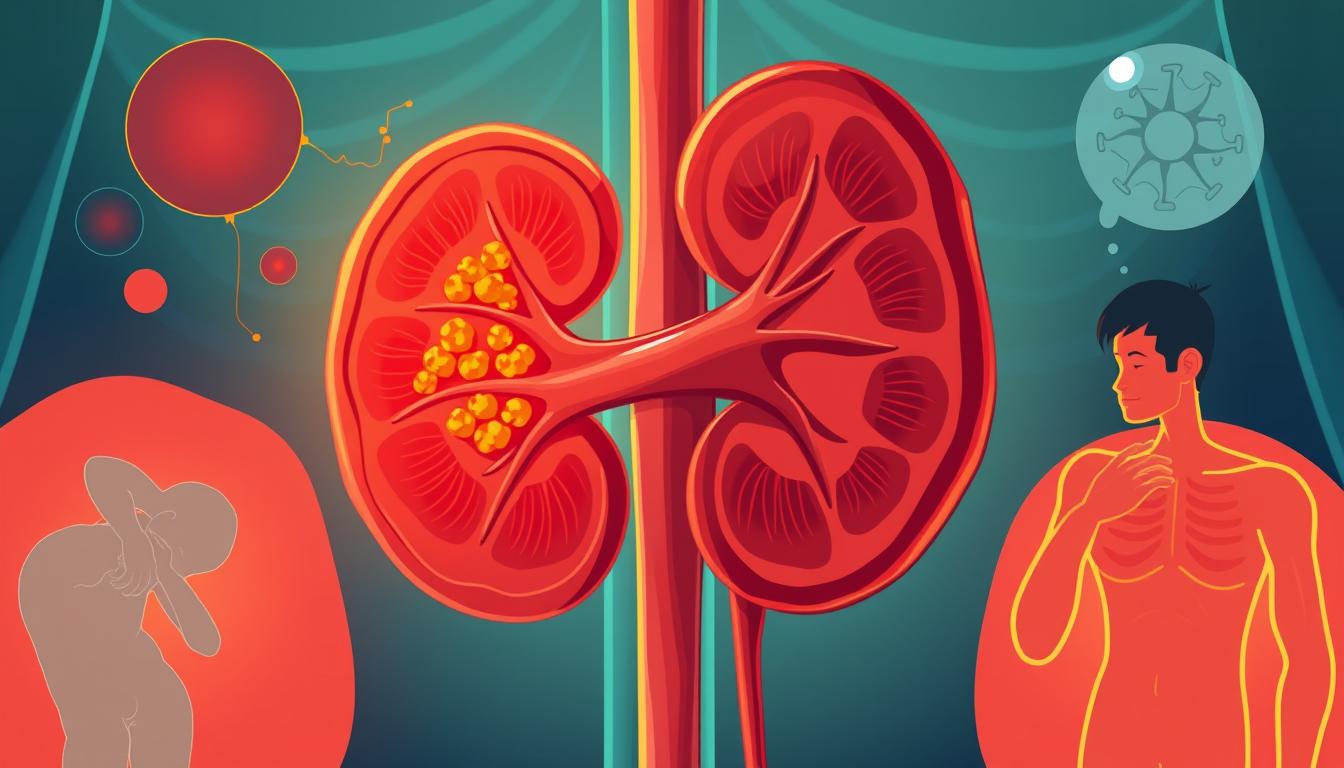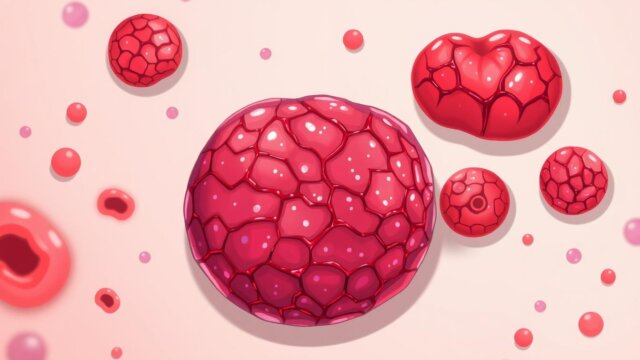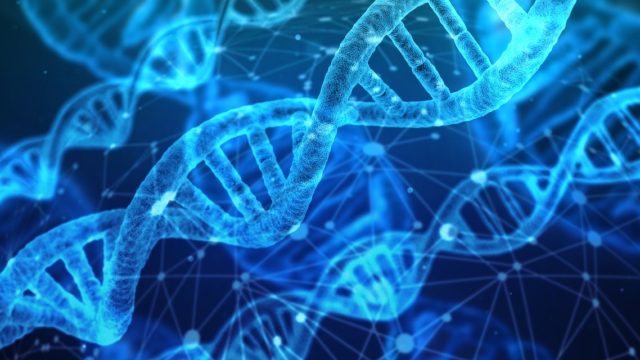FTC disclaimer: This post may contains affiliate links and we will be compensated if you click on a link and make a purchase.
Kidney cancer takes over 14,000 American lives each year. It’s a big concern. Most people get diagnosed with it when they’re 64. It hits older folks hard, and men get it twice as often as women.
Knowing the signs, risks, and treatments is key. It helps catch it early and manage it well.
Kidney cancer starts when kidney cells grow out of control. Most cases, about 90%, are renal cell carcinoma (RCC). Finding it early is vital. It opens up more treatment choices and improves patient outcomes.
Key Takeaways
- Kidney cancer is the most common type of kidney cancer, affecting over 14,000 Americans annually.
- The average age of kidney cancer diagnosis is 64, and it is twice as common in men as women.
- Renal cell carcinoma (RCC) accounts for approximately 90% of all kidney cancers.
- Early detection is crucial for successful treatment, as it allows for a wider range of options.
- Understanding the symptoms, risk factors, and treatment options for kidney cancer is essential for effective management.
What is Kidney Cancer?
Kidney cancer, also known as renal cancer, grows in the kidneys. These bean-shaped organs filter waste and excess water from the blood. The most common kidney cancer is renal cell carcinoma (RCC), making up about 85% of all malignant kidney tumors.
Types of Kidney Cancer
While RCC is the most common, there are other types of kidney cancer. These include:
- Clear Cell RCC: The most common subtype, representing about 75% of cases.
- Papillary RCC: Accounting for approximately 10% to 15% of kidney cancer cases.
- Chromophobe RCC: Occurring in around 5% of cases.
- Clear Cell Papillary RCC: Accounting for approximately 2-4% of all cases.
- Collecting Duct RCC: Observed in around 1% of cases.
- Medullary RCC: Seen in about 1% of cases and more common among young African Americans with sickle trait.
- Unclassified RCC: Making up around 2-3% of cases.
- Urothelial Carcinoma: A type of non-renal cell cancerous kidney tumor arising from the renal pelvis and representing a small percentage of kidney tumors.
- Wilms Tumor: A rare pediatric malignancy occurring in children aged 2-5 years old.
- Renal Sarcoma: A rare kidney cancer type comprising less than 1% of cases.
Renal Cell Carcinoma
Renal cell carcinoma (RCC) is the most common kidney cancer. It starts in the lining of the small tubes in the kidney.
Knowing about the different types of kidney cancer is key to the right diagnosis and treatment.
Risk Factors for Kidney Cancer
Many things can raise your chance of getting kidney cancer. Knowing these can help you prevent it or catch it early.
Being older is a big risk. People over 75 are more likely to get kidney cancer. Smoking and being overweight also increase your risk. Smoking can lead to RCC, the most common kidney cancer type. Being overweight can cause hormonal changes that might lead to cancer.
High blood pressure is another risk. Even with meds, high blood pressure raises your cancer risk. Long-term dialysis and a family history of kidney cancer also increase your risk.
Risk Factor | Increased Risk |
|---|---|
Older Age | Kidney cancer rates are higher among individuals aged 75 and above. |
Smoking | Smoking increases the risk of renal cell carcinoma (RCC), the most common type of kidney cancer. The risk is directly proportional to the amount smoked. |
Obesity | Excess body weight can lead to hormonal changes that may contribute to the development of kidney cancer. |
High Blood Pressure | Individuals with high blood pressure face a greater likelihood of developing kidney cancer, even with the use of blood pressure medications. |
Long-term Dialysis | People with advanced kidney disease, especially those requiring dialysis, face a greater risk of renal cell carcinoma. |
Family History | A strong family history of renal cell carcinoma, especially among siblings, increases the likelihood of developing kidney cancer, potentially due to shared genes or environmental exposures. |
Knowing and managing these risks is key to preventing or catching kidney cancer early. Regular health checks and talking to your doctor can help keep you safe.
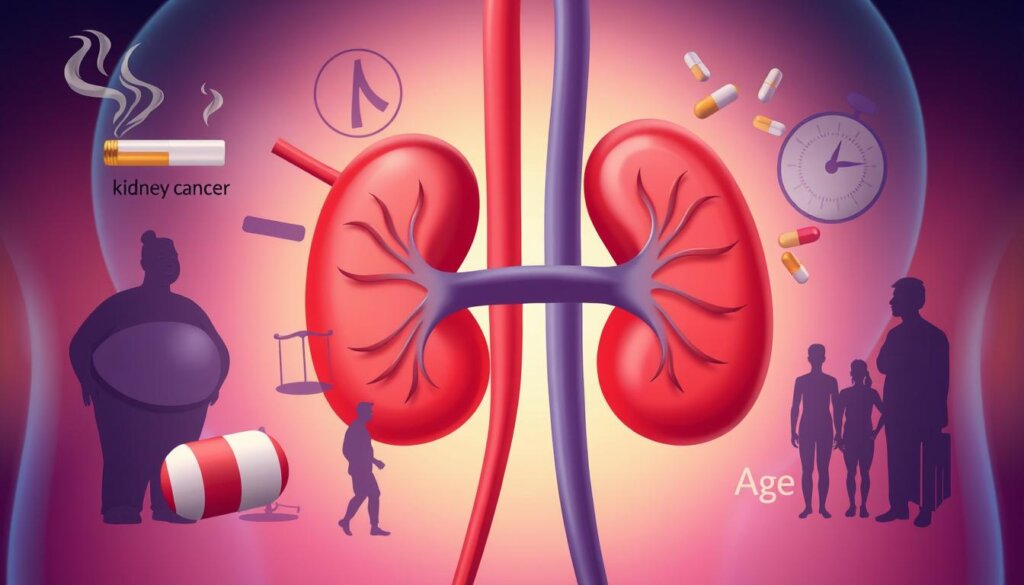
Symptoms of Kidney Cancer
Kidney cancer often doesn’t show clear signs early on, making it hard to catch. But as it grows, people might notice blood in their urine, back pain, or weight loss. They might also feel tired a lot or lose their appetite.
In later stages, kidney cancer can cause fever and night sweats.
Early Signs of Kidney Cancer
In the beginning, kidney cancer might not show any symptoms. This makes it hard to find it early. But knowing the early signs can help people get help fast.
Advanced Symptoms
When kidney cancer gets worse, symptoms get more serious. You might feel a lump, have a fever, or have anemia. It’s important to tell your doctor about these signs right away. Early treatment can really help.
Symptom | Prevalence |
|---|---|
Blood in the urine (hematuria) | 60-80% of cases |
Back or flank pain | 40-60% of cases |
Unexplained weight loss | 30-60% of cases |
Fatigue | 20-40% of cases |
Fever | 20% of cases |
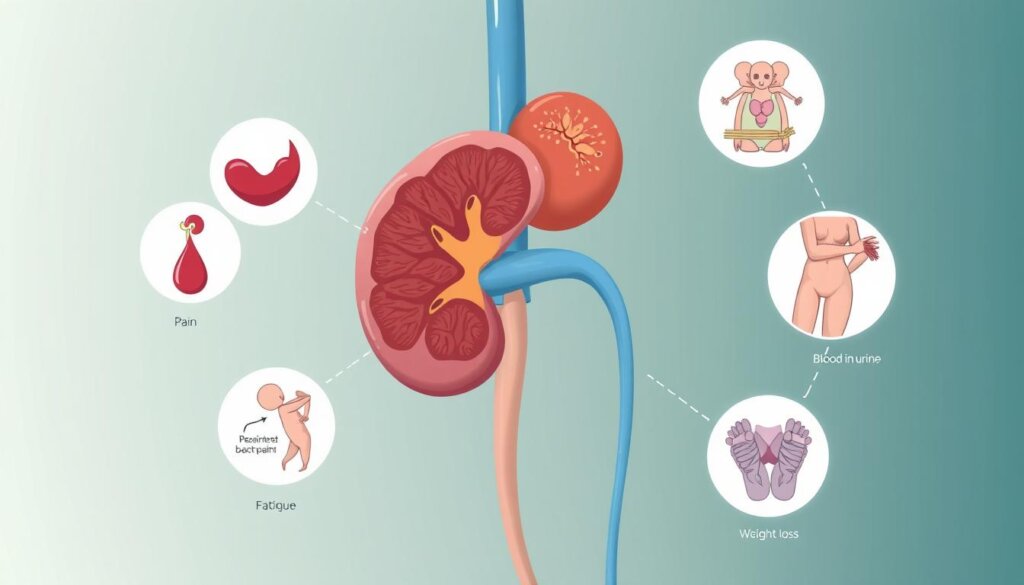
“Kidney cancer is often called the ‘silent killer’ because it can grow without causing any noticeable symptoms in the early stages.” – Dr. Jane Doe, Oncologist
If you notice any of these symptoms, see your doctor right away. Early treatment can make a big difference for kidney cancer patients.
Diagnosing Kidney Cancer
Diagnosing kidney cancer involves several tests and procedures. First, your doctor will do a physical exam. They will look for any unusual growths or swelling in your abdomen.
Diagnostic Tests
If your doctor thinks you might have kidney cancer, they will suggest some tests. These include:
- Blood and urine tests: These can find signs of kidney cancer like anemia or high blood platelets.
- Imaging tests: Scans like ultrasound, CT, and MRI help see the kidneys and find tumors. MRI also checks if the cancer has spread to major blood vessels.
- Biopsy: Sometimes, a biopsy is done to get a tumor sample for analysis.
Staging Kidney Cancer
After finding kidney cancer, more tests are done to see how far it has spread. This helps decide the best treatment and what to expect. They look at the tumor size if it’s in nearby lymph nodes or other organs, and how widespread it is.
The Fuhrman grade is used to rate renal cell cancers. It ranges from 1 to 4, based on how much the cancer cells look like normal kidney cells. Grade 1 cancers grow and spread slowly, while Grade 4 cancers are more aggressive.
Researchers at NYU Langone are working on better imaging for kidney cancer. This could lead to earlier detection and better treatment choices.
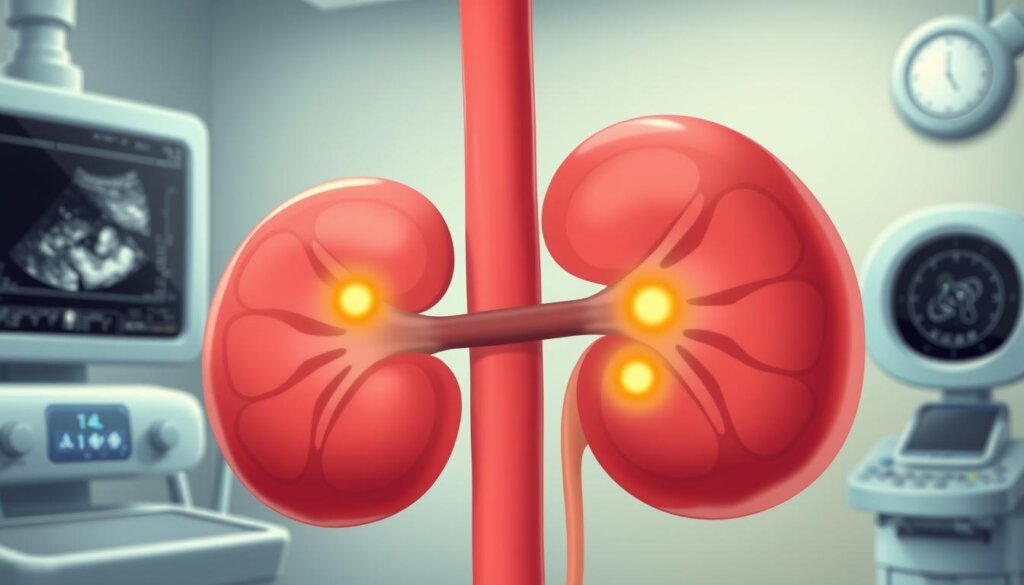
Kidney Cancer Treatment Options
Surgery for Kidney Cancer
Surgery is often the first step in treating kidney cancer. The type of surgery depends on the tumor’s size and location. For small tumors, a partial nephrectomy might be used, where only the tumor is removed.
For larger tumors, the whole kidney might need to be removed. This is called a complete nephrectomy.
The cancer’s stage is key in choosing the right surgery. For early stages, treatments like partial nephrectomy or radical nephrectomy are common. Sometimes, drugs like pembrolizumab are added to these treatments.
In more advanced stages, removing the kidney is often the main surgery. This might be followed by other treatments.
When the cancer has spread, surgery is less likely. Instead, treatments like immunotherapy and targeted drugs are used. Surgery might still be an option if the tumor can be removed safely.
For cancer that comes back, treatments can include surgery, radiation, or drugs. Clinical trials might also be an option.
Choosing the right surgery for kidney cancer is important. Doctors look at the tumor’s size, location, and stage. They also consider the patient’s health and what they prefer.
New surgical methods, like minimally invasive procedures, have improved results. They also help patients recover faster.
Non-Surgical Kidney Cancer Treatments
Surgery is a main treatment for kidney cancer. But, there are non-surgical ways too. These are good for small tumors or when surgery is not right. Cryoablation and radiofrequency ablation (RFA) are two such methods.
Cryoablation and Radiofrequency Ablation
Cryoablation freezes and kills cancer cells. RFA uses heat to destroy tumors. These methods are less painful and have shorter hospital stays than open surgery.
Cryoablation is best for small tumors in high-risk patients. RFA is another option.
These treatments are good for small, local tumors. They’re also for those not fit for surgery because of age or health. Talk to your doctor to see what’s best for you.
Other non-surgical treatments include targeted therapy, immunotherapy, and radiation therapy. They might be used alone or together, based on the cancer’s stage.
“Minimally invasive surgeries at MD Anderson for kidney cancer result in less pain, shorter hospital stays, and quicker recovery times compared to traditional open procedures that require incisions ranging from 4 to 8 inches.”
Kidney Cancer
Kidney cancer, also known as renal cell carcinoma, grows in the kidneys. These organs filter waste and excess water from the blood. It’s the most common kidney cancer, making up about 90% of cases. The clear cell type is the most common, making up 9 out of 10 cases.
Kidney cancer hits men more often, with men twice as likely as women to get it. Being overweight and having advanced kidney disease can raise your risk. African Americans also face a higher risk.
There are many ways to treat kidney cancer, like surgery and targeted therapies. For small tumors, ablation therapy might be used. Drugs like sunitinib and sorafenib are often the first choice for advanced cancer. Immunotherapy uses the body’s immune system to fight cancer cells.
Kidney cancer often doesn’t respond to chemotherapy. However radiation therapy can help kill cancer cells in the bone and ease pain.
Knowing about kidney cancer types, risks, and treatments is key. It helps both individuals and doctors to catch and treat it early. By staying informed and getting medical advice, you can protect your kidneys and improve your chances.,
Kidney Cancer Subtypes | Prevalence |
|---|---|
Clear Cell Carcinoma | About 80% of all RCC cases |
Papillary Renal Cell Carcinoma | Second most common type |
Transitional Cell Carcinoma | Forms in the tubes that drain the kidney and can act like bladder cancer |
Wilms’ Tumor | Primarily occurs in children and accounts for 95% of pediatric kidney cancer cases |
Renal Sarcoma | A rare type of kidney cancer that originates in the blood vessels and connective tissue surrounding the kidneys |
“Kidney cancer is often resistant to chemotherapy drugs, and radiation therapy may be employed in cases where the cancer has spread to the bone, to help kill cancer cells and relieve pain.”
Living with Kidney Cancer
Getting a kidney cancer diagnosis can be scary. But, with the right ways to cope and stay active, you can get through it. Learning to take care of yourself is key to managing kidney cancer every day.
Coping Strategies
Dealing with kidney cancer needs a few steps. Learning about it, joining a support group, and managing stress are helpful. Also, talking openly with your doctors and asking for what you need is important.
Importance of Physical Activity
Being active is vital for those with kidney cancer. It can lessen anxiety, depression, and tiredness. It also boosts your physical health and happiness. Always talk to your doctors about the right exercise for you.
Your fight with kidney cancer is special. Finding the right mix of managing your health and staying active can greatly improve your life. By using coping strategies and staying active, you can be strong and thrive, even with challenges.
“Staying active and focusing on my physical and mental well-being has been a game-changer in my journey with kidney cancer. It’s empowering to take an active role in my own recovery.”
Prevention and Screening
Smoking, being overweight, and high blood pressure can raise your risk of kidney cancer. Living healthy, stopping smoking, and managing health issues can help prevent it.
Screening early is key to finding kidney cancer when it’s still treatable. Tests like IVP, CT scans, MRI, and ultrasound are recommended for those at high risk.
- No screening tests are advised for those at average risk.
- Urine tests might find blood in the urine, but it could also mean other issues.
- Imaging tests can spot early cancers, but the benefits might not be worth the risks.
- Many cancers are found by chance during tests for other reasons, leading to better survival rates.
- People with certain genetic conditions face a higher risk of kidney cancer.
- Regular exams and scans are suggested for those with genetic conditions.
- Tests are also recommended for those with long-term dialysis for kidney disease.
- Genetic counseling and testing are advised for those with a family history of kidney cancer.
- Genetic tests look for gene mutations, not the cancer itself, to assess risk.
Screening high-risk patients early can lead to better outcomes. Look out for blood in the urine, anemia, unexplained weight loss, swelling, and fever. The Urologic Oncology Program at Moffitt Cancer Center works hard to find the best screening methods.
The team at Moffitt Cancer Center includes experts in diagnosing and treating kidney cancer.
Outlook and Prognosis
The outlook for kidney cancer patients varies a lot. It depends on the disease’s stage and other key factors. The sooner kidney cancer is found and treated, the better the chances.
Patients with early-stage kidney cancer have a 93% 5-year survival rate. This is compared to 74% for those with regional disease and just 17% for distant metastatic cancer.
New treatments like surgery, targeted therapies, and immunotherapy have helped. These advancements have raised survival rates for kidney cancer. Stage I kidney cancer, with tumors up to 7 centimeters and no spread, has a good outlook.
However, larger tumors in Stage II and cancers that have spread to lymph nodes or nearby tissues in Stage III have a less favorable prognosis.
The type and grade of kidney cancer also matter. Low-grade, slower-growing tumors like Papillary and Chromophobe renal cell carcinomas have a better prognosis. This is compared to more aggressive types like Collecting Duct Carcinoma.
Patients with metastatic disease are evaluated using the IMDC risk model. This model looks at performance status, time from diagnosis to treatment, and blood cell counts to estimate prognosis.
It’s crucial for kidney cancer patients to talk about their specific prognosis and treatment plan with their healthcare team. Thanks to ongoing cancer research and care, the outlook for many kidney cancer patients is getting better.
“The survival rate for kidney cancer is highly dependent on the stage at diagnosis. Early detection and prompt, appropriate treatment are crucial for the best possible outcome.”
Conclusion
Kidney cancer is a serious condition. But, with more awareness and early detection, many patients are doing better. Renal cell cancer is more common in men than women. Most of these cancers are adenocarcinomas, like clear cell and granular cell types.
Wilms’ tumor, a type of kidney cancer, mainly affects children.
Knowing the risks, symptoms, and treatments can help you stay on top of your kidney health. Studies have looked into the genetic causes of kidney cancer. They’ve found links between HIF overexpression and fumarate hydratase loss. They’ve also explored targeted therapies like Axitinib and Sunitinib.
With the right care, many kidney cancer patients can live well. They can keep a good quality of life.
Kidney cancer is a serious diagnosis, but doctors are getting better at treating it. By keeping up with the latest research, you can work with your healthcare team. This way, you can make the best choices for your health.
Early detection and proactive management are crucial. They help you manage kidney cancer and get the best results.
FAQ
What is kidney cancer?
Kidney cancer happens when cells in the kidneys grow too much. It’s the most common kidney cancer type.
What are the symptoms of kidney cancer?
Symptoms include blood in urine, back or side pain, loss of appetite, and unexpected weight loss. Finding it early is crucial for treatment.
What are the risk factors for kidney cancer?
Risks include being older, smoking, being overweight, high blood pressure, long-term dialysis, and family history. These can increase your risk.
How is kidney cancer diagnosed?
Doctors use blood and urine tests, ultrasound, CT, and MRI scans. Sometimes, a biopsy is needed. More tests check the cancer’s stage.
What are the treatment options for kidney cancer?
Treatment depends on the cancer’s stage and your health. Options are surgery, targeted therapies, immunotherapy, and non-surgical methods like cryoablation.
What is the prognosis for kidney cancer patients?
The outlook varies based on the disease’s stage and other factors. Early detection and treatment improve the prognosis.
